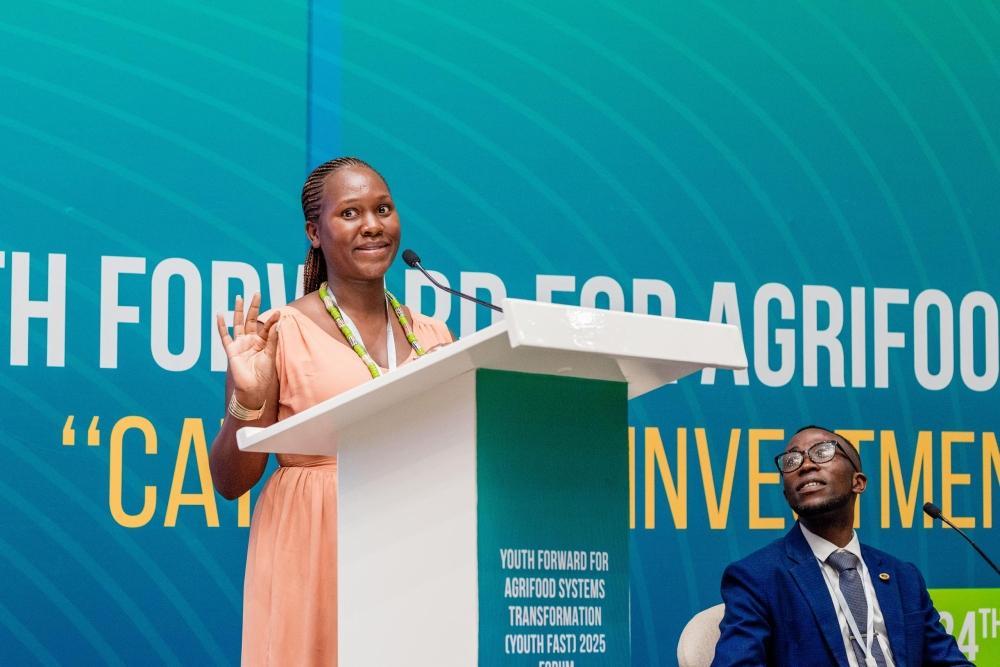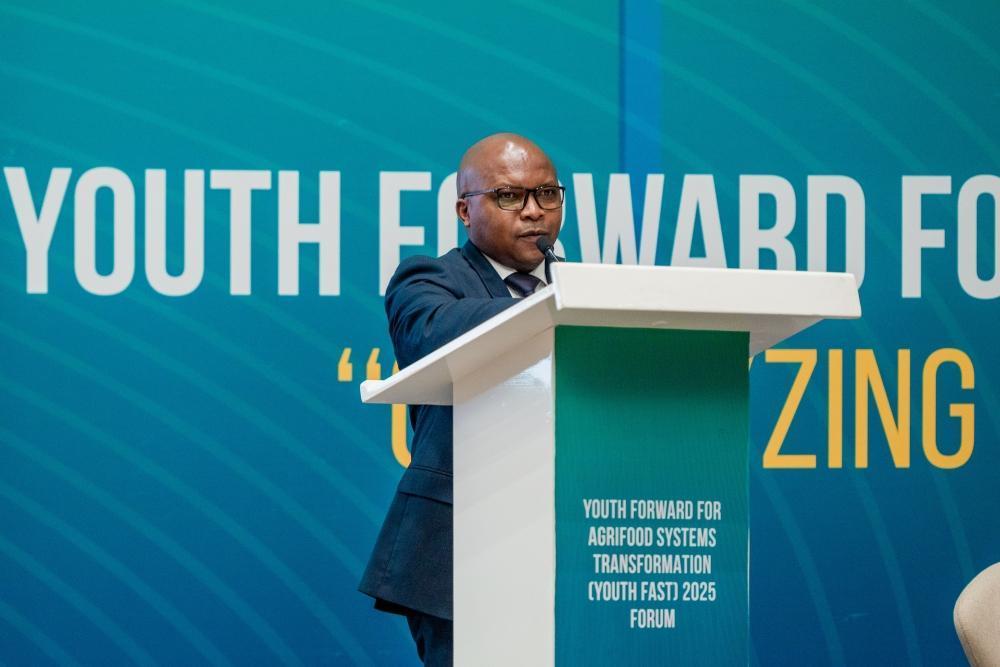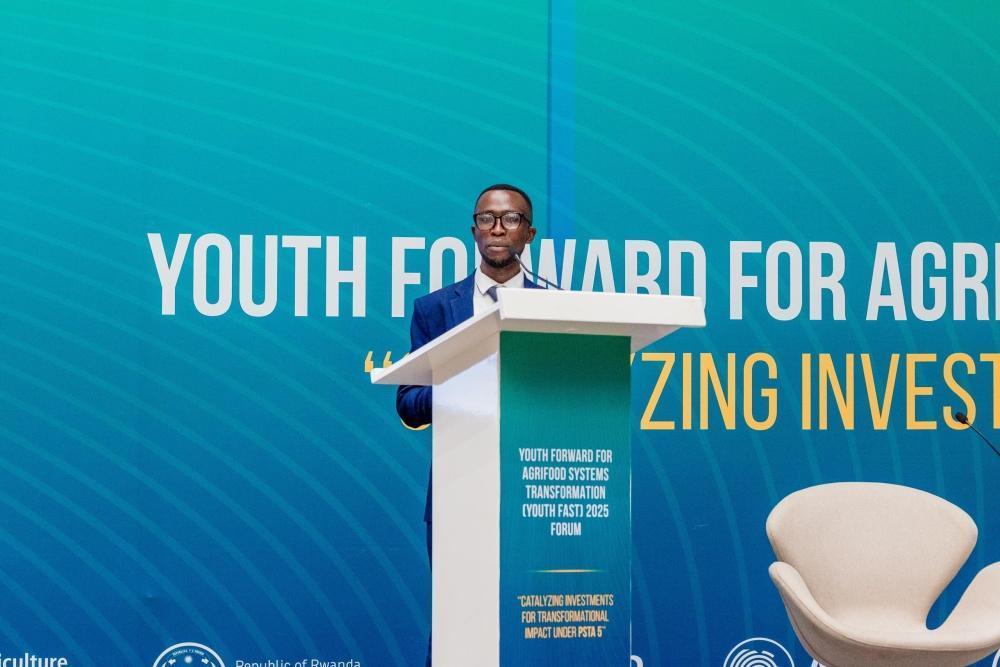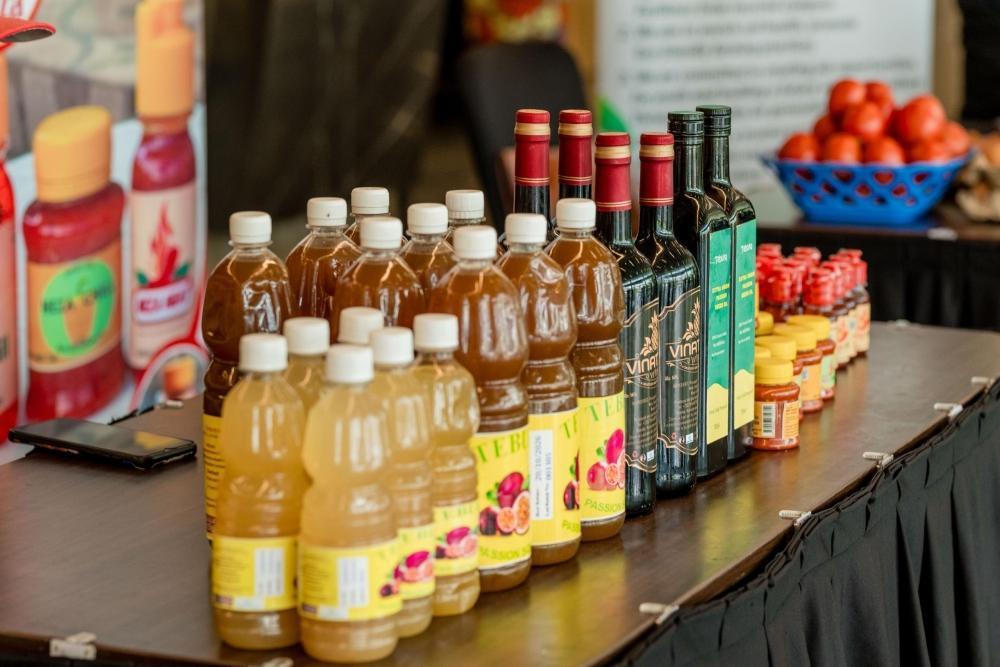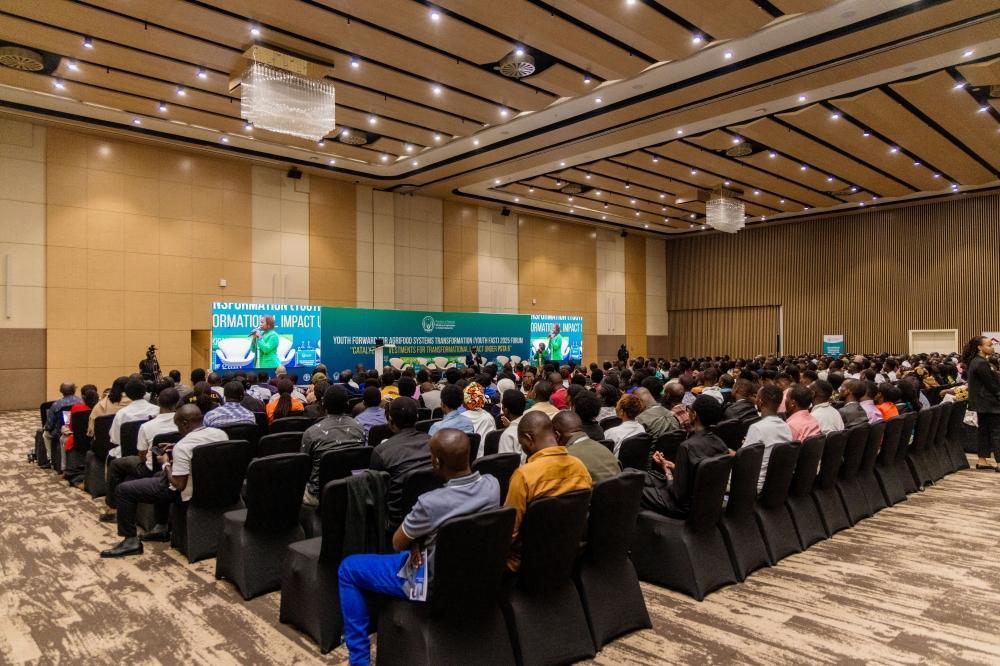Africa-Press – Rwanda. Growing up in Rusizi District, where farming was a common source of livelihood, Mico Mariette disliked agriculture.
At 24, Mico, now a university graduate, openly admits she once wanted nothing to do with farming. As a child, she associated agriculture with mud-covered neighbours. In her community, farming was often linked to academic failure; whenever a student performed poorly, people said they would end up “farming rice.”
The Minister of State for Agriculture and Animal Resources, Telesphore Ndabamenye, addresses attendees during an event. Courtesy
Unexpectedly, Mico is an agripreneur, growing crops in greenhouses and engaging in exports.
She shared her experience on November 24, at the opening of the Youth Forward for Agrifood Systems Transformation (YOUTH FAST) Forum 2025, themed “Catalyzing Investments for Transformational Impact under PSTA 5.”
Her unexpected journey mirrors a broader shift happening across Rwanda, where young people are rediscovering agriculture not as their grandparents practised it, but as a high-tech, innovative sector that offers employment, income, and a future.
But how did Mico find herself with an attachment to agriculture?
Determined to avoid such a future, Mico chose the Mathematics–Physics–Chemistry combination in upper secondary school to distance herself from biology and anything that could lead to an agricultural degree.
She later joined the University of Rwanda’s College of Science and Technology to study energy engineering, believing she had successfully escaped agriculture.
But financial hardship—surviving on a Rwf40,000 monthly allowance—pushed her toward small business activities after graduation. While selling clothes in line with running side hustles, she and a friend developed an idea for using precision agriculture technology to monitor soil moisture, fertiliser needs and pH levels.
This idea led them to pitch in entrepreneurship competition, where they won a Rwf10 million grant through the Imali Agribusiness Challenge in 2023. That moment changed everything.
Considering the current situation, she said she realised her attempt to completely run away from agriculture was a mistake.
“Agribusiness is giving me the opportunities I was searching for.”
Yet the road was not easy. When she first grew tomatoes, the price dropped from Rwf2,000 [a kilogramme] to Rwf600 by harvest—losing 70 per cent of the expected income. The shock forced her to change strategy.
She adopted contract farming to avoid market uncertainties.
Today, Mariette operates three greenhouses and farms five hectares, supplying the international export market.
“A person may need a doctor once or twice a year. But they need food three times a day,” she said. “That means farmers matter—and I am proud to be one.”
She hopes to become one of Rwanda’s leading greenhouse farmers and highlights three keys to success in agribusiness: market assurance, access to finance, and collaboration. She also received support from the Business Development Fund to expand her business.
Janvier Nsanzimana: From Rwf30,000 to a 3,000-litre-a-day factory
Concerned by youth unemployment—then over 20 percent—and widespread post-harvest losses, Janvier Nsanzimana decided to take action. In 2024, With just Rwf30,000, he began producing juices from various fruits, including pineapple, passion fruit, lemon and ginger. Starting with 30 litres per day, he sold about 50 bottles through street marketing. Demand grew quickly. Pineapple.
Encouraged by a friend, he entered an entrepreneurship challenge under the auspices of YouthConnekt whereby he emerged the winner and got Rwf25 million which helped him expand his agro-processing business.
Production soon increased from 30 litres to 3,000 litres per day. His company now employs more than 16 people.
Janvier holds a bachelor’s degree in education, but he said he later trained in agro-processing at an American institution based in Arusha. He now encourages fellow youth to consider agribusiness.
Janvier Nsanzimana shares his agribusiness journey at the Youth Forward for Agrifood Systems Transformation (YOUTH FAST) Forum 2025 in Kigali on November 24.
“When you put effort into agro-processing, you realise it creates jobs, profit and huge opportunities,” he said.
Youth FAST Forum: government and partners reaffirm commitment to youth-led transformation
The government of Rwanda and development partners emphasised youth as central to modernising agriculture under the Fifth Strategic Plan for Agriculture Transformation (PSTA 5), running from 2024 to 2029.
Telesphore Ndabamenye, the Minister of State for Agriculture and Animal Resources, said Rwanda is committed to expanding youth access to skills and markets, unlocking finance, scaling innovations and ensuring young people’s voices shape the sector.
He said that youth are the centre of achieving the country’s ambition to transform its food systems:
“We are shifting to the era of digitalisation. The youth are deploying digital tools, developing climate-smart innovations, and mostly going to higher technologies,” he said citing irrigation, mechanisation, and even setting up some enterprises engaged in value addition to farm produce
FAO Representative to Rwanda Nomathemba Mhlanga underscored the need to explore what the youth can achieve today and in the future, harness their power and discuss their role in shaping food systems agri-food systems that are sustainable, resilient, inclusive and prosperous.
“Youth is key, especially in Africa and in other developing countries, to replacing an aging agricultural workforce. They are key to driving innovation and adapting to climate challenges,” she said.
Chantal Ingabire, the Director General of Planning in the Ministry of Agriculture and Animal Resources, said that youth unemployment was around 20 per cent as of 2023 (the baseline), while youth make up 32 per cent of farmers, and 65.3 per cent of Rwanda’s population is under 30. Young women face even higher unemployment level compared to the 17.3 per cent national average, making youth-centred support essential, she said.
The Youth FAST Forum, she said, aligns with Rwanda’s Vision 2050, which aims to reduce unemployment to 7 per cent by 2035 while accelerating digitalisation, mechanisation and climate-smart agriculture.
Products processed by youth on display at the forum in Kigali. Courtesy
The Youth Forward for Agrifood Systems Transformation (YOUTH FAST) Forum 2025 opened in Kigali on November 24. Courtesy photo
For More News And Analysis About Rwanda Follow Africa-Press

